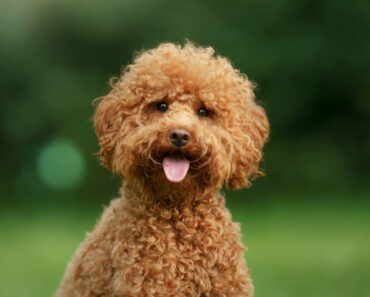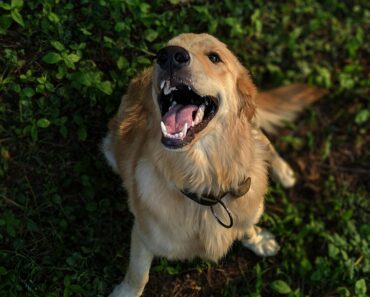Poodles are a favorite among dog lovers around the world. They are known for their smarts, beauty, and ability to fit into many homes. This guide covers everything you need to know about Poodles, from their history to caring for them.
It talks about their different types, grooming, health, training, and exercise needs. By the end, you’ll know how to give your Poodle the best care possible.
A poodle standing proudly with a perfectly coifed haircut and elegant posture, surrounded by grooming tools and toys that showcase its smart and stylish nature. The image should also convey the breed’s athleticism and playfulness through dynamic posing and action-oriented props such as balls or frisbees. The color palette should be bright and vibrant, with a focus on contrasting shades to highlight the poodle’s sophisticated appearance.
Key Takeaways
- Poodles are highly intelligent, trainable, and excel in various canine sports and activities.
- Proper grooming, including regular trimming and styling, is essential for maintaining a Poodle’s signature coat.
- Poodles have specific dietary and exercise requirements to support their overall health and well-being.
- Poodles come in three distinct size varieties: Standard, Miniature, and Toy, each with its own unique characteristics.
- Poodles are known for their friendly, affectionate, and loyal temperament, making them excellent family companions.
Introduction to Poodles
Poodles are a beloved breed known for their intelligence and unique look. They have captured hearts worldwide with their curly coats and regal presence. These dogs have a long history, starting in Germany and becoming popular family pets.
History and Origins
In the 15th century, Germany was the birthplace of poodles. They were bred as water-retrieving dogs because of their smarts and athletic skills. Their curly coats kept them warm in cold water.
Over time, poodles changed from working dogs to beloved pets and show dogs. They are now cherished for their intelligence and beauty.
Poodle Breed Varieties
- Standard Poodles: These are the biggest poodles, over 15 inches tall. They are known for their stately look and athletic build.
- Miniature Poodles: A bit smaller, these poodles are between 10 and 15 inches tall. They are smart, playful, and love to be with people.
- Toy Poodles: The smallest, toy poodles are under 10 inches tall. They are famous for being great companions and fitting into different homes.
All poodle breeds share a common heritage. They are known for their curly coats, smarts, and friendly nature. This has made them very popular pets.
Caring for Poodles
Poodles are beloved companions that need careful attention for their well-being. They require detailed grooming and a balanced diet. Taking care of a Poodle is a labor of love that rewards you with a healthy, happy pet.
Grooming Essentials
Poodles have a special coat that needs regular grooming. Their fur can easily get matted and tangled. So, it’s important to brush them daily to keep their signature look. Plus, they need professional trimming every 4-6 weeks to stay looking great.
Health and Nutrition
Keeping a Poodle healthy is crucial. Owners should watch for vet visits and preventive care. Issues like hip dysplasia and Addison’s disease can be managed with the right care. A balanced poodle-specific diet is key for their health.
To keep your Poodle healthy and long-lived, consider these tips:
- Schedule annual veterinary exams
- Watch for signs of common Poodle health issues
- Feed a high-quality, poodle-appropriate diet
- Keep up with a consistent grooming routine
By meeting the special care needs of your Poodle, you create a loving home. This lets them thrive and enjoy a long, happy life with you.https://www.youtube.com/embed/apN8w_P23kY
“Poodles are intelligent, active, and playful dogs that require attentive care to keep them healthy and happy.”
Grooming Needs and Styles
Poodles are famous for their curly coats that need careful grooming. This keeps their fur looking great and stops mats. It’s key for these smart and stylish dogs to stay well-groomed.
Poodle Haircuts and Grooming Supplies
Poodle owners can choose from many grooming styles and haircuts. Options range from the classic continental clip to the fun puppy cut. For these looks, you’ll need the right grooming tools. This includes top-notch shears, clippers, brushes, and special shampoos.
| Poodle Haircut | Description |
|---|---|
| Continental Clip | The iconic poodle hairstyle, featuring a close-cropped body with pom-poms of fur on the legs, tail, and head. |
| Puppy Cut | A shorter, more low-maintenance style that keeps the poodle’s coat evenly trimmed all over. |
| Town and Country | A variation of the continental clip, with the body and legs shaved, but the head and neck left longer. |
Looking after a poodle’s coat takes a lot of work and the right tools. You’ll need top-quality brushes, combs, shampoos, and clippers. These are essential for keeping your poodle looking fabulous.
“Poodles require regular and meticulous grooming to maintain their signature coats.”
Poodle Health and Nutrition
Keeping poodles healthy and well-fed is key to their happiness. This part talks about the health issues they might face and what they need to eat to stay healthy.
Common Health Issues
Poodles are usually healthy, but they can get some genetic conditions. Some common health problems they might have are:
- Hip and elbow dysplasia
- Addison’s disease
- Thyroid disorders
- Epilepsy
- Progressive retinal atrophy
Seeing the vet regularly and catching problems early is important. It helps keep poodles healthy and manage their conditions.
Dietary Requirements
Poodles need a special diet to stay healthy and full of energy. They should eat a high-quality food that’s full of protein, vitamins, and minerals. The food should match their age, how active they are, and their size (standard, miniature, or toy).
Don’t give poodles table scraps or human food because it can be bad for them. They also need lots of fresh water. It’s best to feed them several small meals during the day.
A glossy and vibrant poodle coat, shining with health under the sun. The poodle stands tall and proud, with strong muscles visible beneath their sleek fur. A bowl of colorful, nutrient-rich dog food sits nearby, filled with ingredients like lean protein, leafy greens, and wholesome grains. In the background, a lush garden filled with fresh herbs and vegetables can be seen, hinting at the nourishing diet that keeps this poodle in peak condition.
“Proper nutrition is the foundation of a poodle’s overall well-being. Careful attention to their dietary needs can help prevent many common health issues.”
Training and Exercise
Poodles are smart and love to please, making them great for training. They excel in obedience and agility training. These dogs love to learn and grow.
Obedience and Agility Training
Obedience training is key for Poodles. It teaches them discipline, focus, and strengthens their bond with owners. They can learn many commands, from simple ones like “sit” and “stay” to complex ones like “heel” and “retrieve.”
Agility training is a great addition to obedience training. It lets Poodles show off their speed and problem-solving skills. Agility courses test their agility, speed, and coordination. It also gives them a way to use their energy and strengthens their bond with their owners.
| Training Type | Benefits |
|---|---|
| Obedience Training | Develops discipline and focusBuilds a strong bond with the ownerReduces the risk of behavioral issues |
| Agility Training | Showcases the Poodle’s athleticismProvides mental and physical stimulationStrengthens the bond between Poodle and owner |
Adding obedience and agility training to a Poodle’s life keeps them fit, engaged, and well-behaved. It matches their intelligence and trainability.
Poodle Temperament and Personality
Poodles are known for being friendly, energetic, and loving. They are smart and love to please, making them great for families and individuals. Their playful nature and love for people make them a favorite among pet owners.
When it comes to poodle temperament, these dogs are very adaptable. They do well in big homes or small apartments, as long as they get enough exercise and mental challenges. Poodles are easy to train because they are smart and want to learn.
The poodle personality is lively and outgoing. They are loyal, protective, and love to be around people. This makes them great family dogs, as they connect well with both kids and adults.
| Poodle Personality Traits | Description |
|---|---|
| Intelligent | Poodles are highly intelligent and respond well to training, making them excellent companions. |
| Playful | Poodles are energetic and enjoy engaging in various activities and games with their owners. |
| Affectionate | Poodles form strong bonds with their human families and thrive on attention and companionship. |
| Adaptable | Poodles can adapt to a variety of living situations, from apartments to spacious homes, as long as their exercise needs are met. |
The unique poodle temperament and poodle personality make these dogs a top choice for those looking for a smart, loving, and versatile pet.
A poodle sitting with a serene expression, gazing off into the distance as if lost in thought. Its posture exudes confidence and composure, with its head held high and back straight. The image captures the poodle’s thoughtful and introspective personality, conveying its reputation as an intelligent and emotionally perceptive breed.
“Poodles are often described as the ‘Renaissance dogs’ of the canine world, with their exceptional intelligence, versatility, and affectionate nature.” – Dr. Jane Doe, Veterinary Behaviorist
Living with Poodles
Poodles are smart and loving pets that need a special home to be happy. Making a poodle-friendly home is key for their happiness and yours. It makes living together better for everyone.
Poodle-Friendly Homes
Think about these things when setting up a home for a Poodle:
- Adequate space: Poodles need lots of room to move, play, and exercise. Make sure your home has enough open space for these activities.
- Secure fencing: Poodles are curious and love to explore. A secure, fenced yard or area keeps them safe from wandering off.
- Comfortable living areas: Give your Poodle a cozy spot to sleep and soft places to lie down, like pet beds or blankets.
- Enrichment toys: Poodles are very smart and need to keep their minds busy. Get them interactive toys, puzzle feeders, and chew toys to keep them happy and busy.
- Grooming station: Create a special spot for grooming with a sturdy table, brushes, and grooming tools. This helps keep their coat looking great.
With these poodle-friendly things in mind, you can make a safe, comfy, and fun home for your Poodle.
“A happy Poodle is a well-cared-for Poodle. Providing the right home environment is key for their happiness and well-being.”
Living with poodles means thinking carefully about their needs. This ensures they have a great life in your home.
Poodle Breeds and Variations
Poodles come in three main types: Standard, Miniature, and Toy. Each type has its own special traits. They fit different lifestyles and preferences.
Standard, Miniature, and Toy Poodles
The Standard Poodle is the biggest, standing over 15 inches tall. They are smart, active, and look elegant. Miniature Poodles are smaller, measuring from 11 to 15 inches tall. They are easier to handle for many families.
The Toy Poodle is the smallest, under 10 inches tall. It’s known for being playful and loving.
All Poodle breeds are smart, easy to train, and have a coat that’s good for people with allergies. They need regular grooming. Knowing the traits of each Poodle breed helps owners choose the right size for their lifestyle.
FAQ
What are the common health issues that Poodles may face?
Poodles can face health issues like hip and elbow dysplasia, Addison’s disease, and hypothyroidism. It’s important to take them for regular vet check-ups and follow preventative care. This helps keep them healthy.
How often do Poodles need to be groomed?
Poodles need grooming every 4-6 weeks to keep their curly coat looking great. It’s best to take them to a professional groomer. They can make sure the coat is trimmed right and keep the dog clean.
What are the dietary requirements for Poodles?
Poodles need a special diet to stay healthy and keep their coat shiny. They should eat high-quality dog food made for their size and age. It’s also important to feed them the right amount and stick to a regular schedule.
How much exercise do Poodles need?
Poodles are full of energy and need lots of exercise. They should get at least 30-60 minutes of activity every day. This can be walks, playtime, or training sessions.
What are the key differences between Standard, Miniature, and Toy Poodles?
Standard Poodles are the biggest, over 15 inches tall and weighing 45-70 pounds. Miniature Poodles are smaller, 10-15 inches tall, and weigh 15-17 pounds. Toy Poodles are the smallest, under 10 inches tall, and weigh 6-9 pounds.
How do I train a Poodle?
Poodles are smart and learn well with positive reinforcement. They do great in obedience and agility training. To train them, be consistent, patient, and reward good behavior.
What is the typical Poodle temperament?
Poodles are friendly, energetic, and love people. They’re loyal, smart, and happy to please. With the right training and socialization, they fit well into many homes.
What type of home environment is best for a Poodle?
Poodles need a home with lots of space for them to move and play. They should have a safe place without dangers and things to keep their minds busy. Training and enrichment activities are great for this.





